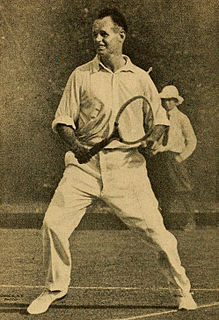A Quote by Theodore Kaczynski
People do not consciously and rationally choose the form of their society. Societies develop through processes of social evolution that are not under rational human control.
Related Quotes
Man has risen, not fallen. He can choose to develop his capacities as the highest animal and to try to rise still farther, or he can choose otherwise. The choice is his responsibility, and his alone. There is no automatism that will carry him upward without choice or effort and there is no trend solely in the right direction. Evolution has no purpose; man must supply this for himself. The means to gaining right ends involve both organic evolution and human evolution, but human choice as to what are the right ends must be based on human evolution.
They are men and women who tend to believe that the human being is perfectible and social progress predictable, and that the instrument for effecting the two is reason; that truths are transitory and empirically determined; that equality is desirable and attainable through the action of state power; that social and individual differences, if they are not rational, are objectionable, and should be scientifically eliminated; that all people and societies strive to organize themselves upon a rationalist and scientific paradigm.
If your struggle with the conflicting parts of yourself is conscious, you are able to choose consciously the response that will create the karma that you desire. You will be able to bring to bear upon your decision an awareness of what lies behind each choice, and the consequences of each choice, and choose accordingly. When you enter into your decision-making dynamic consciously, you insert your will consciously into the creative cycle through which your soul evolves, and you enter consciously into your own evolution.
You could make a good case that the history of social life is about the history of the technology of memory. That social order and control, structure of governance, social cohesion in states or organizations larger than face-to-face society depends on the nature of the technology of memory - both how it works and what it remembers. In short, what societies value is what they memorize, and how they memorize it, and who has access to its memorized form determines the structure of power that the society represents and acts from.
Bearing in mind that "the market" is not an invention of capitalism but that it has existed for thousands of years in many different societies, social justice logically requires that the profits resulting from the operation of markets and infrastructures created by society be equitably shared within societies and in a larger context within the human family.
Investors, monarchies, and parliamentarians devised methods to control the processes of wealth accumulation and the power that came with it, but the ideology behind gold fever mobilized settlers to cross the Atlantic to an unknown fate. Subjugating entire societies and civilizations, enslaving whole countries, and slaughtering people village by village did not seem too high a price to pay, nor did it appear inhumane. The systems of colonization were modern and rational, but its ideological basis was madness.
The social dynamics of human history, even more than that of biological evolution, illustrate the fundamental principle of ecological evolution - that everything depends on everything else. The nine elements that we have described in societal evolution of the three families of phenotypes - the phyla of things, organizations and people, the genetic bases in knowledge operating through energy and materials to produce phenotypes, and the three bonding relations of threat, integration and exchange - all interact on each other.






































